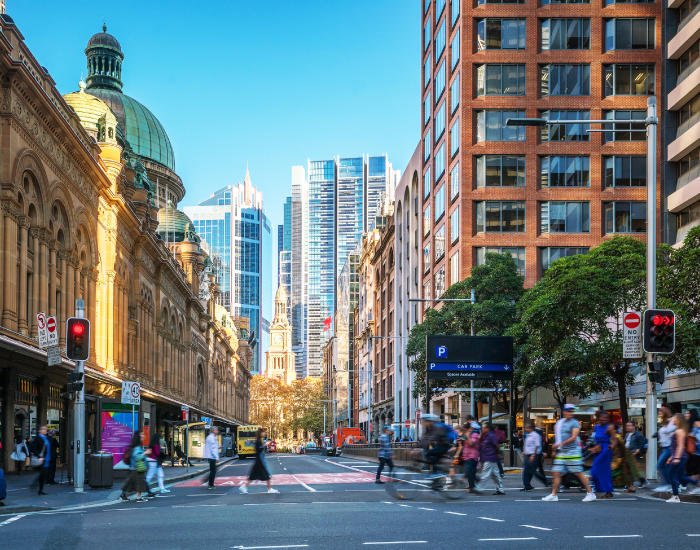- News and articles
- Events
- Find usIDP AustraliaIDP BahrainIDP BangladeshIDP CambodiaIDP CanadaIDP ChinaIDP EgyptIDP GhanaIDP Hong KongIDP IndonesiaIDP IranIDP JordanIDP KenyaIDP KoreaIDP KuwaitIDP LebanonIDP MalaysiaIDP MauritiusIDP Middle EastIDP NepalIDP New ZealandIDP NigeriaIDP OmanIDP PakistanIDP PhilippinesIDP Saudi ArabiaIDP SingaporeIDP Sri LankaIDP Taiwan, ChinaIDP ThailandIDP TurkeyIDP UAEIDP VietnamIDP Corporate
- English
Topics covered
- 5 min
- Published: 6 June 2024
- Updated: 5 June 2024
Study Abroad | Dummies guide about studying in Australia
Australia has become a popular destination for international students due to its top universities. Additionally, Australian tuition fees are relatively cheaper than those in Europe and the United States. The education system in Australia is known for its flexibility, offering a wide range of courses at different qualification levels, and is closely monitored by the government to ensure quality education. Students can benefit from this system by having access to a diverse range of programs and knowing that their education is being closely monitored.
The Australian education system and pathways
Hong Kong secondary 4 students have the option to study in Year 11 in Australia and take public exams in Year 12 to enter Australian universities. If they have completed Form 5, they can choose to study a one-year foundation course at university, which does not need to take the public examination. Additionally, students can opt to study Certificate or Diploma courses in Australia, which focus on practical and professional skills training and can lead to a second year of a Bachelor's degree if the results meet the requirements. Apart from that, students can also apply to universities in Australia with their DSE results or current school grades.
Tuition Fees and Living Costs
The Australian government recommends that students budget $19,830 AUD per year for their personal living expenses, with accommodation taking up a large portion of the cost of living. The average tuition fee for tertiary education in Australia ranges from $20,000 to $40,000 AUD per year, depending on the subject and institution. Additionally, students should also allocate funds for entertainment and leisure activities. Based on an exchange rate of HKD 5.5 to AUD 1, the basic annual expenses are approximately HKD 300,000. Therefore, it is important to be financially prepared and have a clear understanding of the average expenses in Australia, which are generally cheaper compared to Europe and the United States.
Documents required for student visa

After applying for a place at the university of choices, an offer letter from the institution will be sent. Students can pay their tuition fees and arrange accommodation. After that students can apply for the visa until they receive a confirmation of enrolment from the institution. To complete the visa application, students can apply in person at the Australian Visa Application Centre (AVAC) or online and then prepare to depart once the visa has been successfully submitted and approved.
Depending on your nationality and course of study, the information required to apply for a visa will vary. Generally, you will need to submit proof of acceptance (e-Admission letter), health insurance (Overseas Student Health Cover) terms and conditions, proof of funding, a Genuine Temporary Entrant (GTE) declaration, proof of English language skills, a valid passport and a visa application fee.
Popular subjects and entry requirements

Australian universities generally use students' best five or six DSE subjects as admission requirements. For example, for the 2022 intake, top Australian universities may admit students with a score of 433 or even 333, depending on the university or the desired subject of study. As for English language requirements, undergraduate courses generally require a 4 in DSE or 6.0 to 6.5 in IELTS, while some specialist subjects require an IELTS of 7.0, or even no less than 7.0 in each subject. The most popular subjects in Australia include occupational therapy, physiotherapy, medicine, nursing, engineering, and computer science, with most of these degrees having professional qualifications that are recognised worldwide, which lay a foundation for future careers.
Weather and quality of life
Australia's mild weather attracts many students to study in Australia, especially those who do not like the hot, humidity and polluted air of summer and winter. Australia also has the second best quality of life in the world, after Norway. With excellent infrastructure, first-class health services, a wide range of transport options, numerous student services and a relatively affordable cost of living, Australia is definite a study paradise for international students. Australia excels in terms of quality of life, employment opportunities, living costs and student communities, with five of the world's top 30 cities for students. The Australian government also encourages international students to study here, offering around $200 million in scholarships, work visas and research opportunities in a variety of fields. You may also be eligible for permanent residency upon graduation.
Some of Australia's cities such as Sydney and Melbourne have been voted the world's best cities to live in, giving parents peace of mind that their children study in Australia. A relaxed pace of life and a safe living environment that will provide the international students a comfortable place for striving excellent career opportunities. There are a number of reasons and benefits that attract a large number of students planning to study in Australia. Want to find out more? Contact us today!
One account for all your study abroad needs
Create your profile and unlock a wide array of features including personalised recommendations, fast-tracked applications and much more.
Search for articles
Dive into our extensive collection of articles by using our comprehensive topic search tool.







